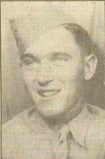Remembering
Staff Sergeant Max Bruno Trenn (1918 - 1944)
US Army, WWII - Europe, KIA

Remembering - Staff Sergeant Max Bruno Trenn by Evo G. Facchine
Max Bruno Trenn, the youngest of five children of Max Bernard and Blanche Benovich Trenn was born on December 20, 1918 in the small community of Force, Elk County, Pennsylvania. Son of immigrant parents, his father was German, his mother of Polish decent.
The story of this family begs the question; do some families have to bear more than their share of tragedy? For tragedy came early in life for Max, when at the tender age of seven while in the second grade in Force schools, his father was killed in a mine accident in the old Proctor Mines. Horrible as this was it was witnessed by Max’s older brother Frank (Zenta) who was his fathers mining partner or “buddy” as it was called in those days. His mother never remarried and raised her family of two boys and three girls all by herself counting on the income of young Zenta, only sixteen years old, who out of necessity went back into the mine to work, to support the family.
It is a matter of record that young Max also followed in the footsteps of his father and brother by entering the mines to work for he received his Mining Papers on February 20, 1940.
In December of 1942, young “Mucky” Trenn, as he was known to his family and friends, became Private Max B. Trenn, 33015260, 23rd Regiment, 2nd Infantry Division, US Army. The Division trained at Camp McCoy, Wisconsin where it pioneered in the first large scale winter training program and maneuvers ever conducted by the United States Army.
On October 8, 1943 his outfit was sailing out of New York arriving in Northern Ireland on the 20th of that month. During winter and early spring of 1944 they engaged in intensive training on the bleak open wastelands of Ireland, in preparation for the invasion of France.
On June 7th, 1944, D-Day plus 1, young Max and the 2nd Infantry Division landed on Omaha Beach. They participated in heavy fighting while inching their way through the hedgerow countryside of France to the famous town of St. Lo, France.
Note that his training and locations exactly parallel the activities of last weeks hero, but the writer was unable to determine if the two soldiers knew each other or ever met, nor did the other veterans interviewed, seem to know Max, but then again the 2nd Infantry Division was a big organization.
Following the fall of St. Lo on July, 17, 1944, his infantry division was given a short respite that was interrupted by an overnight motor march of two hundred ten miles to the Port City of Brest France. There from August 21 to September 19 the organization battled the 2nd German Paratroop Division which fanatically defended the Port City. Brest was important to the Germans because it was a port for their U-boats and at the same time was badly needed by the Allies to establish a supply route into France. Hitler’s orders to hold the Port for at least ninety days, at all costs, lead to the most savage and bitter street fighting of the war. In spite of all else the city fell in just 39 days. It is no wonder that Max, in one of his last letters, wrote to his sister "Its mighty tough going over here, don’t tell Mom.”
The city came under the control of the Allies on September 19, but Max was not there to celebrate the victory. Staff Sergeant Max B. Trenn, Squad Leader was killed by enemy small arms fire on August 30, 1944. Listed as missing in action in the initial notice to the family, his death was confirmed by telegram on September 27th.
Following the news of his death, Max’s mother suffered a heart attack from which she never really recovered. Bedridden for most of the time until her untimely death on July 8, 1949, at age 62, she received almost daily visits from Dr. Betty Hayes, resident Doctor in the Valley at that time.
Clearly, the casualties of war extended to the home front.
Flashing back to Max’s days in Wisconsin provides an interesting human touch to this story.
While stationed there, Max met and became engaged to a young beautiful girl named Arlene Hickish. To this day, the now Mrs. Keith Felix, of Plymouth, Indiana, sends Christmas cards, always accompanied by a letter, to Gertrude Trenn Grunthaner, of St. Marys, sister of Max, and to my cousin Margaret Facchine Trenn of Force, widow of Frank (Zenta) Trenn. So compelling was this information that the writer could not resist the temptation to talk with her by phone. She was most gracious and in our brief conversation she related that she had visited the Trenn family on at least three occasions and after Max was transferred from Camp Mc Coy, she too joined the military as a WAC. Her final words were, “He was a truly wonderful young man.”
Sergeant Trenn was first interred at the US Military Cemetery in St. James France, after the end of the war he was moved to his permanent resting place, in that same Cemetery occupying Plot H, Row 6, Grave 9, with the familiar Cross for a headstone. Although a headstone marker can be found engraved with his name at the Cemetery in Force, beside his mother, his body was never requested to be returned to the US for fear of the consequences to his mother’s poor health.
There’s more to these stories than one dare tell, which confirms the old saying “War is Hell.”
Lest We Forget…
